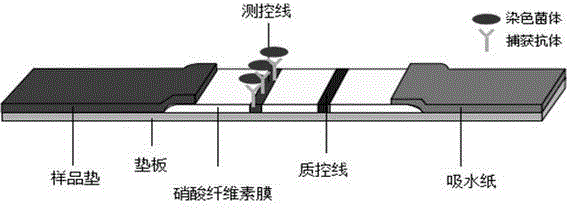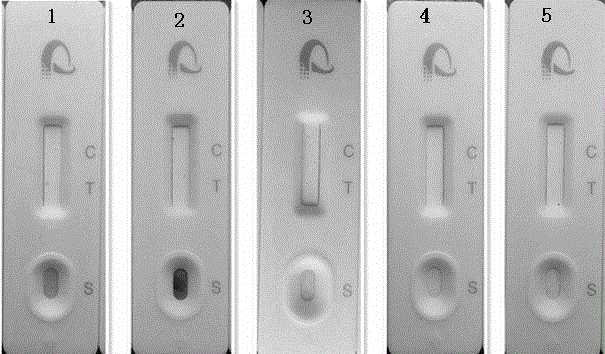Test paper box capable of detecting escherichia coli O157:H7
A technology of O157 and Escherichia coli, applied in the field of bacteriology and immunology, can solve the problems of human health and safety impact, obvious material matrix effect, poor stability, etc., and achieve the effects of cost saving, simple process and convenient preparation.
- Summary
- Abstract
- Description
- Claims
- Application Information
AI Technical Summary
Problems solved by technology
Method used
Image
Examples
Embodiment 1
[0030] Example 1 : Single antibody test strip structure description and preparation method of the present invention
[0031] 1. The test strip box of the present invention
[0032] The test paper box for detecting Escherichia coli O157:H7 includes a single antibody test strip and a fluorescent dye box; the single antibody test strip includes a sample pad, a nitrocellulose membrane, an absorbent pad and a PVP base plate, and its specific structural features are : The nitrocellulose membrane is pasted on the PVP base plate; one end of the base plate is a sample pad, and the other end is an absorbent pad; the width is 3-4mm / cut and then a single antibody test strip; the nitrocellulose The membrane is sprayed with Escherichia coli O157:H7 antibody as the detection line T line, and the anti-fluorescent dye antibody spray quality control line C line;
[0033] Fluorescent dye cartridges contain the fluorescent dyes propidium iodide, fluorescein diacetate (FDA), acridine orange, or...
Embodiment 2
[0046] Example 2 : Test strips after bacteria stained with other dyes
[0047] Common dyes saffron, sand yellow, crystal violet and common fluorescent dye DiOC 18 (3) After staining Escherichia coli O157:H7 with fluorescein isothiocyanate (FITC) for 10 minutes, put the sample on the test strip of the present invention. Spray the corresponding dye antibody on the C line;
[0048] The result is as image 3 As shown, other dyes were found to be unable to develop color on the test strip. It is speculated that these dyes are not suitable for use in test strips. When they combine with the bacteria, they also combine with the nitrocellulose membrane or sample pad of the test strip, so that the stained bacteria cannot migrate on the test strip. , and finally cannot develop color. And four kinds of fluorescent dyes of propidium iodide, fluorescein diacetate (FDA), acridine orange or SYBR Green screened by the present invention can be preferably suitable for the use of test strips...
Embodiment 3
[0049] Example 3: Test paper box of the present invention detects Escherichia coli O157: H7
[0050] Get the test paper box that embodiment 1 prepares;
[0051] The number of cells taken was 10 2 、10 3 、10 4 、10 5 、10 6 、10 7 、10 10 Escherichia coli O157:H7 suspension was stained with 0.01% fluorescent dye solution for 5 min. Add 4 drops of the sample (about 100 μL) to the sample hole of the test strip after the stained bacterial liquid. After reacting for 15 minutes, judge the result under the ultraviolet light. There are two bands at the detection line, and the result is positive. There is no bright band in the detection line, and the result is negative;
[0052] Compared with the detection results of Escherichia coli O157:H7 colloidal gold test strips with the same number of bacteria, Figure 4 Escherichia coli O157:H7 colloidal gold test strip test results show that the lowest detection limit is 10 bacteria 5 to 10 4 between. Escherichia coli O157:H7 single ...
PUM
 Login to View More
Login to View More Abstract
Description
Claims
Application Information
 Login to View More
Login to View More - R&D
- Intellectual Property
- Life Sciences
- Materials
- Tech Scout
- Unparalleled Data Quality
- Higher Quality Content
- 60% Fewer Hallucinations
Browse by: Latest US Patents, China's latest patents, Technical Efficacy Thesaurus, Application Domain, Technology Topic, Popular Technical Reports.
© 2025 PatSnap. All rights reserved.Legal|Privacy policy|Modern Slavery Act Transparency Statement|Sitemap|About US| Contact US: help@patsnap.com



